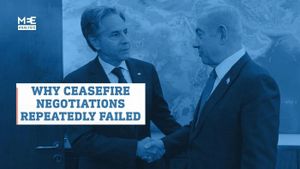OTTAWA - Canada has entered the fray of trade tensions with the United States by imposing retaliatory tariffs on various goods following President Donald Trump's recent announcements. The Canadian government, led by Prime Minister Justin Trudeau, initiated 25 percent tariffs on hundreds of American products, effective immediately, as it responds to steep new tariffs levied by the U.S. against Canadian imports.
On February 2, 2025, Trump signed executive orders placing 10 percent duties on energy and 25 percent tariffs on nearly all other goods imported from Canada, effectively dragging the two neighboring countries, long considered allies, back to the brink of trade war. The federal government released details of its countermeasures less than 24 hours after Trump's announcement, targeting about $30 billion worth of U.S. goods from meat and milk to carpets and curtains.
Trudeau stated, "If President Trump wants to usher in a new golden age for the United States, the...better path is to partner with Canada, not to punish us." His administration indicated plans to introduce additional tariffs later, potentially targeting U.S. automobiles, fruits and vegetables, and other industries valued at nearly $125 billion. This escalation has drawn significant attention not only within Canada but also from international observers concerned about the potential economic fallout.
Several Canadian provinces have already begun concrete steps to mitigate the impact of the new tariffs. Before the measures took effect, British Columbia Premier David Eby announced the immediate suspension of American liquor purchases, aiming to remove U.S. products from local listings. Manitoba's Premier, Wab Kinew, described the trade hostilities as having ramifications for Canadian sovereignty, emphasizing, "This is a question about national identity. This is a question about who we are as Canadians and Manitobans." His sentiments echo widespread feelings of uncertainty among Canadians as they navigate the shifting sands of trade relations.
Social media has also played a role as many Canadians express their discontent by canceling U.S. subscriptions and encouraging each other to actively choose locally-made products. Trudeau urged the nation to check labels and embrace Canadian-made goods during this difficult period. "Now is the time to choose products made right here in Canada," he advised, reflecting the solidarity amid national economic strife.
Many Canadian politicians rallied around the idea of supporting local businesses during this tumultuous time, emphasizing the importance of economic resilience. Liberal leadership candidate Chrystia Freeland made similar calls urging Canadians to avoid U.S. products, joining other party leaders who expressed their commitment to standing against what they termed "unjust tariffs."
With U.S. sanctions seen as violations of international trade agreements, the Canadian government also announced plans to explore legal avenues to challenge the tariffs. Federal officials indicated they would pursue every available remedy under the Canada-U.S.-Mexico Agreement and the World Trade Organization's commitments, demonstrating Canada's intention to assert its rights on the global stage.
While many Canadians express political outrage, the long-term economic consequences remain unclear. Trade analysts warn these tariffs could raise costs for consumers, increase inflation, and potentially destabilize job markets across both countries. The U.S. Chamber of Commerce weighed in, stating, "The tariffs will only raise prices for American families and upend supply chains," highlighting the interconnectedness of the North American economy.
Public sentiment may shift over time, depending on how effectively both governments mitigate trade disruptions and restore confidence. The stark reality, faced by both nations, is the precarious balance of dependency and rivalry, as millions of livelihoods hinge upon constructive dialogue and cooperation.
Negotiations between Trudeau and Trump are already underway, with communication lines remaining open. With calls for significant changes to trade policy on both sides, observers are watching closely to see whether the two leaders can find common ground, or if the tensions will only intensify.
Canada is strategically positioned as it explores avenues to strengthen its economic ties beyond the U.S. market. With over 75 percent of its trade currently intertwined with its southern neighbor, the looming tariffs compel Canada to reconsider its trade partnerships, possibly enhancing its relationships with the European Union.
Experts suggest there could be merit to Canada diversifying its trading partners, especially as countries like Germany express interest in closer collaboration. The repercussions of U.S. policies, at this stage, may just encourage Canada to explore alternate alliances, laying the groundwork for future trading relationships.
Looking forward, the fallout from these tariffs may be significant, with potential changes to trade networks already taking place. While it’s uncertain how the negotiations will evolve, both leaders still face the challenge of restoring calm and prioritizing peaceful economic relations to avoid long-term instability.



